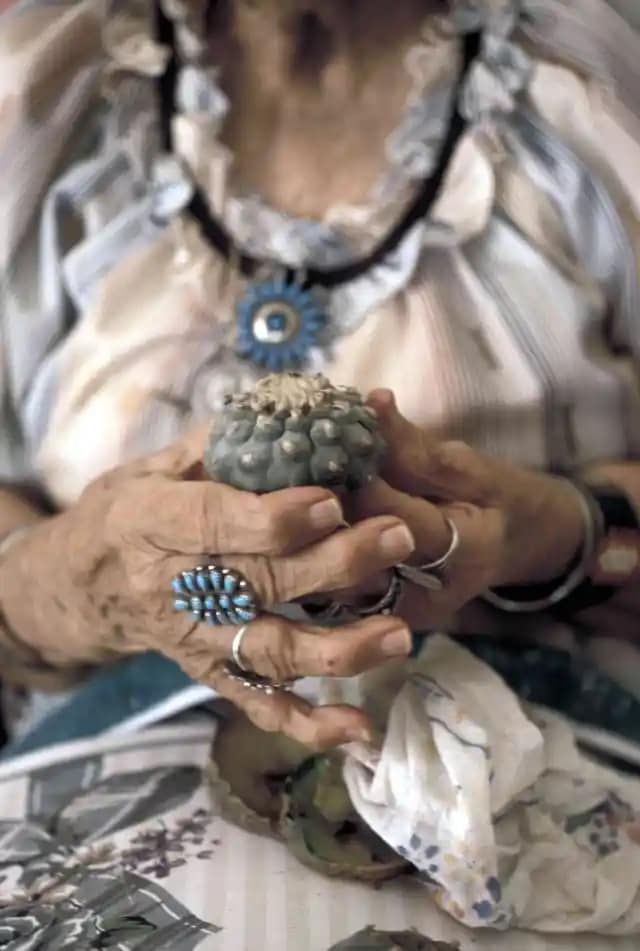
Mrs. Amada Cardenas: Guardian of the Sacred Peyote Gardens
Share

Deep in South Texas, where the mind-expanding peyote cactus (Lophophora williamsii) thrives, lies a place affectionately known as the Peyote Gardens. This land is marked by the modest white house of the late Mrs. Amada Cardenas—an inspiring figure who became the first federally licensed peyote dealer in the United States. Her life story serves as a beacon of compassion and spiritual dedication, following what many refer to as the peyote way.
Born in 1904 within this very region, Amada grew up in a community steeped in folk Catholic traditions and learned the peyote trade from her father. Later, she joined forces with her husband, Claudio Cardenas Sr., and together they embraced the life of peyoteros—individuals dedicated to harvesting and distributing peyote. For decades, they supplied this sacred plant to members of the Native American Church (NAC) from across the United States and Canada. Pilgrims would journey to South Texas to join prayer meetings, seek healing, and purchase peyote to bring back to their communities. Those unable to travel received dried peyote shipped directly to them.
The NAC, a syncretic faith that blends Christianity with various Native American beliefs, places immense spiritual importance on peyote. Although the U.S. government recognized the NAC as a legitimate religion in 1918, its practitioners still faced hardships and discrimination regarding the use of peyote. Over time, federal laws have come to protect the religious rights of NAC members in their use of this sacrament.
Around the time of the church’s formal recognition, many Mexican-Americans—Tejanos—working as cowboys or vaqueros began to supply peyote to Native Americans traveling to South Texas. The Cardenases soon became well-known not only for their role as peyote dealers but also for their kindness and generosity. They welcomed visitors with warmth, participated in prayer meetings on their property, and earned deep respect among Native American communities. One Navajo NAC member recalled how the sacred ambiance of the Cardenas’ home left an indelible mark on her family’s spiritual life.
Despite facing legal risks, including potential prosecution for supplying peyote, Amada and Claudio stood firm in their commitment to protecting the religious freedoms of NAC members. Their dedication was recognized in 1957 when they were appointed Texas Delegates-At-Large for the Native American Church of North America, and later, in 1987, Amada was named an officer of the Native American Church of the United States.
After Claudio’s untimely death in 1967, Amada continued her work in the peyote trade for over a decade. In the 1970s, she became one of the first officially licensed peyote dealers under regulations set by the Texas Department of Safety. Eventually, she retired from active trading, yet her home remained a welcoming sanctuary. Amada’s door was always open to generations of NAC members and visitors, providing food, shelter, and a space for prayer—often hosting gatherings with tipis erected on her property.
Amada’s life was marked by deep spirituality and healing. She maintained a daily ritual of prayer, interceding for family, friends, neighbors, and even people she had never met. Known as a healer, she believed that her long and robust life—she lived almost 101 years—was in part due to her daily consumption of a small amount of peyote. Her healing touch and powerful prayers left lasting impressions on many, as recounted by those who witnessed her miraculous interventions during times of dire need.
Even as she aged, Amada continued to bless everyone who visited. She would sprinkle holy water on guests and their vehicles, offering prayers for safety and well-being, extending her ancient prayers for all living beings. Her vision was to keep her property a sacred refuge—a place where people of all backgrounds could gather to share in the hope, faith, love, and charity symbolized by the peyote tradition.
Since her passing in 2005, her legacy lives on through her son, Claudio Jr., who strives to honor his parents’ traditions despite the challenges of managing the property from afar. Today, the Peyote Gardens face modern threats such as habitat disruption from agriculture, oil drilling, wind turbines, and the overharvesting of peyote. Fortunately, efforts by organizations like The Cactus Conservation Institute and the Indigenous Peyote Conservation Initiative are helping to protect these dwindling populations.
The Peyote Gardens remain a lasting testament to Amada Cardenas’s enduring spirit—a sanctuary where visitors continue to come together to heal, learn, pray, and honor a sacred tradition.
Source: https://chacruna.net/mrs-amada-cardenas-keeper-of-the-peyote-gardens/
